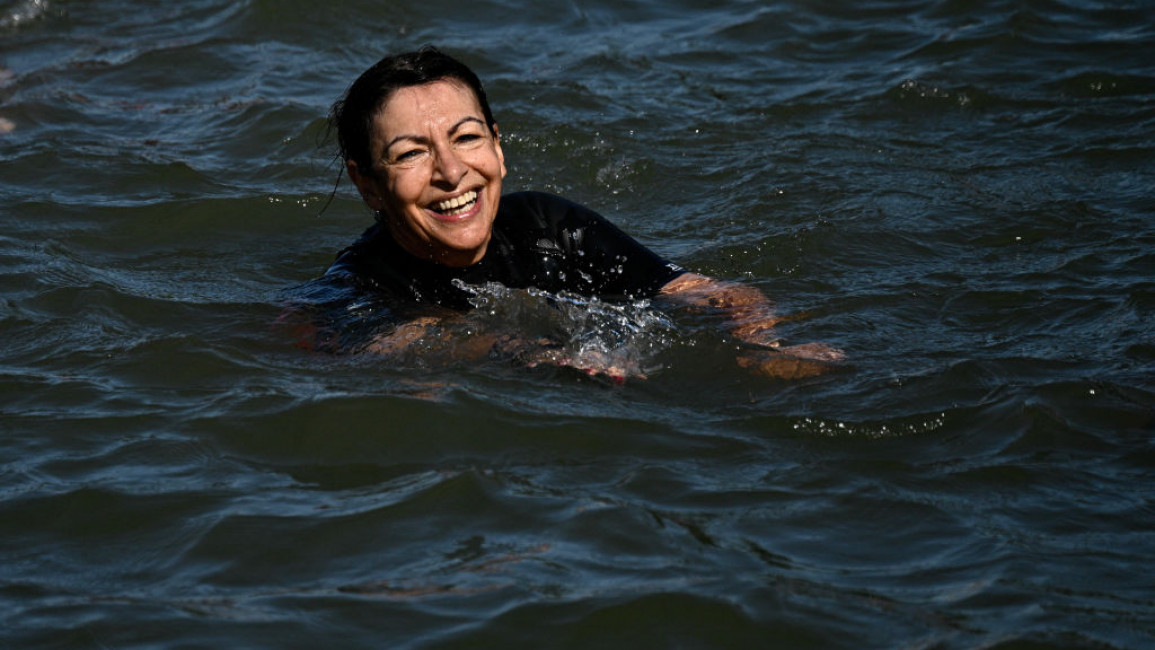Is the Paris Olympics in the Seine river ignoring the 1961 massacre of Algerians?
French President Emmanuel Macron has finally ticked off one of his promises: making the Seine River clean for the Summer Olympics. Yet, sprucing up the Seine might not be enough to gain everyone's approval considering the river's murky past of state violence and colonisation, notably the 1961 massacre in which hundreds of Algerians were killed by the Parisian police.
Paris Mayor Anne Hidalgo and Macron have put their long-standing squabbles aside to devise a plan to 'cleanse' the polluted Seine, where swimming has been banned for over a century.
After investing US$1.4 billion to ready the Seine for the Olympics—mostly to prevent sewage leaks into the river—the Seine has finally passed daily water quality tests.
Donning a wetsuit and goggles, Hidalgo swam in the famed waterway last week as hundreds of onlookers cheered from the riverbanks, fulfilling a promise she made back in January.
For Paris, hosting the Olympic swimming events in the Seine is a momentous occasion, but for many, the river's legacy cannot escape the legacy of the 1961 massacre.
What happened in the Seine?
On the evening of 17 October 1961, men, women, and children—French citizens of Algeria—peacefully marched towards Paris to protest a discriminatory nighttime curfew targeting Algerians in the Paris region.
But the demonstration turned into a massacre. That night, French police beat, killed, and threw between 200-300 Algerians into the Seine, with about 12,000 Algerians arrested in the crackdown. Yet, the official report the next day mentioned only three deaths.
"Their bodies were thrown into the Seine River," President Emmanuel Macron acknowledged in 2021 on the 60th anniversary of the massacre.
Fabrice Riceputi, historian and author of "Ici on noya les Algériens" (Here We Drowned the Algerians), explains that today, "we can only provide a very broad estimate [of the actual number of victims on the night of 17 October 1961], likely ranging from 150 deaths, maybe, to 300".
In March, the National Assembly, parliament's lower house, voted 67-11 in favour of a non-binding resolution condemning "the police brutality" that occurred on 17 October 1961. The resolution also asked that France establish a national day of remembrance.
'Swimming in the cemetery of our brothers'
"Our wounds have not healed yet [...] and they are already organising the Olympics in the cemetery of our brothers," Moha, a French-Algerian young man who grew up hearing the story of his grandfather's protest on the massacre day, remarked to TNA.
Similarly, many other Algerians and North Africans took to social media to voice their frustration.
During more than 132 years of colonisation, France killed between 400,000 and 1.5 million Algerians, in one of its bloodiest colonial conquests in Africa's history.
Sixty-two years since the liberation of Algeria, France has not owned up to the crimes its army and police committed during the war.
As a candidate for the presidency, Macron was one of the few Parisian politicians to break the silence on France's "crimes against humanity" in Algeria. However, during his tenure in office, his policy regarding the war has largely been limited to political gestures.
Macron has even claimed later that Algeria's "official history" was "not based on truth" but "on a discourse of hatred towards France", leading to an ongoing angry rebuke from Algiers.
"France is not sorry [...] Family members who died in Algeria must feel their hearts ache at the rise of Le Pen's influence [far-right party]," commented a user on X, criticising the scheduled Olympic swimming events in the Seine.
In the last legislative election, despite coming third, over 10 million people in France voted for the National Front (far-right), mostly in southern localities with a high concentration of pieds-noirs—French people who lived in North Africa during the colonial era and their descendants—who are known for glorifying the colonisation of North Africa.
The RN's infamous founder, Jean-Marie Le Pen, a proponent of 'French Algeria,' was a paratrooper during the Battle of Algiers in 1957 and was implicated in torture and war crimes based on several investigations over the years.
Moreover, the Seine massacre was perpetuated by police violence against Algerian protesters—a problem that persists to this day.
In 2022 alone, 13 men of African origin were killed by the police in France, which human rights advocates deem part of systemic police violence against Arabs, Muslims, and Blacks, rooted in the country’s colonial history.
Algiers and Paris have yet to address the controversy around the event.
The Summer Olympic Games will kick off on 26 July with a lavish open-air ceremony featuring an athletes' parade on boats along the Seine.





 Follow the Middle East's top stories in English at The New Arab on Google News
Follow the Middle East's top stories in English at The New Arab on Google News


